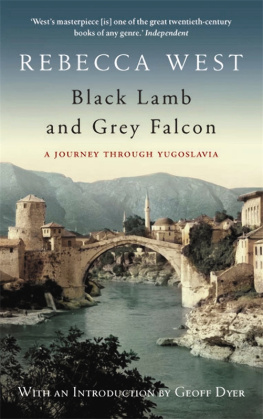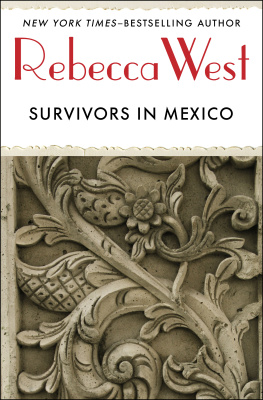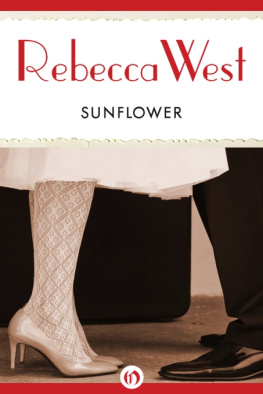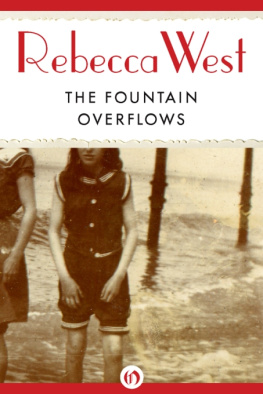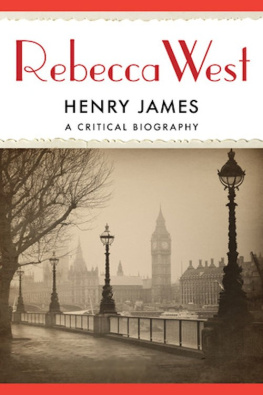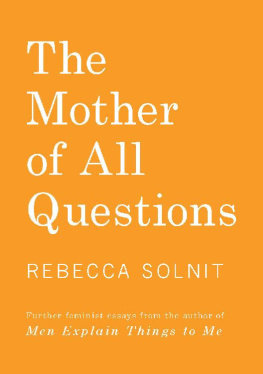Rebecca West - Ending in Earnest, a Literary Log
Here you can read online Rebecca West - Ending in Earnest, a Literary Log full text of the book (entire story) in english for free. Download pdf and epub, get meaning, cover and reviews about this ebook. year: 1976, publisher: Ayer Co Pub, genre: Art. Description of the work, (preface) as well as reviews are available. Best literature library LitArk.com created for fans of good reading and offers a wide selection of genres:
Romance novel
Science fiction
Adventure
Detective
Science
History
Home and family
Prose
Art
Politics
Computer
Non-fiction
Religion
Business
Children
Humor
Choose a favorite category and find really read worthwhile books. Enjoy immersion in the world of imagination, feel the emotions of the characters or learn something new for yourself, make an fascinating discovery.

- Book:Ending in Earnest, a Literary Log
- Author:
- Publisher:Ayer Co Pub
- Genre:
- Year:1976
- Rating:3 / 5
- Favourites:Add to favourites
- Your mark:
- 60
- 1
- 2
- 3
- 4
- 5
Ending in Earnest, a Literary Log: summary, description and annotation
We offer to read an annotation, description, summary or preface (depends on what the author of the book "Ending in Earnest, a Literary Log" wrote himself). If you haven't found the necessary information about the book — write in the comments, we will try to find it.
Ending in Earnest, a Literary Log — read online for free the complete book (whole text) full work
Below is the text of the book, divided by pages. System saving the place of the last page read, allows you to conveniently read the book "Ending in Earnest, a Literary Log" online for free, without having to search again every time where you left off. Put a bookmark, and you can go to the page where you finished reading at any time.
Font size:
Interval:
Bookmark:
ENDING IN EARNEST
69, 149 Words
A Literary Log by REBECCA WEST
MCMXXXI
DOUBLEDAY, DORAN & COMPANY, INC. Garden City, New York
THESE notes represent most of the material which I contributed to the Bookman during 1929 and 1930, as "Letters from Europe," with a few alterations and additions suggested to me by correspondents. The personal manner in which they are written must not be regarded as a sign of undue egotism on my part, but as a result of the agreement between myself and the editor that this was the most useful form they could take at the time; and their episodic nature is due to that cause also.
REBECCA WEST
RESCUED FROM EXCESS | |
CONCERNING THE CENSORSHIP | |
ANOTHER KIND OF CENSORSHIP | |
MANIBUS DATE LILIA PLENIS | |
THE HARDY FLEUR-DE-LIS | |
AND AGAIN... | |
THE DEAD HAND | |
FEMINIST REVOLT, OLD AND NEW | |
JOURNEY'S END | |
THE DUTCH EXHIBITION | |
RAVEL | |
TOLLER | |
NOTES ON THE EFFECT OF WOMEN | |
"JOURNEY'S END" AGAIN | |
RAPT OUT OF TIME | |
PRIZES AND HANDICAPS | |
GOSSE |
MR. SMITHERS |
ORANGESTO ORANGES |
O. M. |
EX MULTIS UNUM |
PERVIGILIUM VENERIS |
HEAD OF A GIRL |
EVERY THIRD THOUGHT... |
INCREASE AND MULTIPLY |
STRIKING EXAMPLE OF THE POWER |
MISS GYE |
CURIOUS IDOLATRY |
FORMIDABLE |
TRIUMPH OF ERROR |
GIDE |
AUTUMN AND VIRGINIA WOOLF |
SEEING SNAKES |
EVELYN WAUGH |
ELEMENTARY CONSIDERATION |
MAURICE AND CONSTANT LAMBERT |
THE PITOEFFS |
VALENTINE TESSIER |
FRENCH LIFE AND THE FRENCH |
LE MONSIEUR AUX CAMELIAS |
ELEGY |
REGRETFULLY |
SO MANY books are published nowadays that works deserving of a considerable measure of survival are swamped almost immediately and sink into the region of the forgotten. It shocked me to see that when Arnold Rothstein was shot and the newspapers were publishing all the information about him they could find, not one journalist mentioned that he had obviously served Mr. Scott Fitzgerald as model for Meyer Wolfsheim in The Great Gatsby. Yet The Great Gatsby was surely a remarkable novel. For one thing it gave a superbly imaginative vision of the gaunt outskirts of New York, where the same force that makes the city sends up sporadic buildings, but does not form them or the life they house into civilized patterns as it does in the city. The prodigiousness of the garage proprietor and his wife, and their complete irrelevance to anything but violence, linger in my mind as vividly as when I read it; and so does the damnation of Daisy and her husband and her friends when they drift into this world of violence because they are incapable of doing anything in their own. This novel has not been superseded in the common mind by better books: merely by other books.
Bad as this excess of publication is when it steals from us the memory of what we have read, it is worse still when it prevents us even finding out what we should enjoy reading. I have no time to read the French reviews regularly, and so it was only by the good luck of reading an article in the New Statesman, by Mr. T. W. Earp, the art critic, that I discovered that an extremely interesting book on Claude Monet has just been published by, of all people in the world, M. Clemenceau. They were apparently great friends, and indeed Monet's great healthy body would make him feel amity for "The Tiger," who, whatever else he may be, is certainly a good animal. The particular phase of Monet's being treated by Clemenceau in this little book is that which resulted in Les Nymphas: the series of paintings in which he rendered various aspects of his water gardens. We have one panel in London in the Tate Gallery: which has some very lovely modern French painting. But most of them are in the singularly bashful Muse de l'Orangerie, a sister-ship to the Jeu du Paume building, in the Jardin des Tuileries, but over on the Seine side where nobody sees it. It would be worth visiting if only to see the beautiful recumbent figure just outside it which is Maillol's Memorial to Czanne; but it is the Monets inside which make a visit to it one of the best experiences the world has to offer. Bourgeois art, if you insist; but nobody objects to that except members of the bourgeoisie trying to escape from themselves.
One goes into two rooms, each wall of which is covered by a long low picture of some part of a water garden, including in each case some water lilies, and finds that these eight panels, which form a factual point of view, are thematically monotonous, are all completely different, and all of the first importance in the emotions they create. There is one in particular that most beautifully presents the static and the dynamic in relation. At the bottom of the canvas are the firm nodes of four or five water lilies on which the whole composition seems to be resting. Light fused with the colour of sky and cloud is reflected from all over the sunlit water with the extremest vivacity; and willow branches droop down through this pattern, superimposing on it another pattern of a rhythm different but in divine agreement. The result of this balance is the most beautiful sense of serenity which one cannot help projecting upon the painter. One finds oneself thinking that when Monet painted these pictures he must have arrived at a state of complete happiness, have gone to stay with someone kind and wealthy who treated him like a beloved child and had had those lily ponds ready for him in the garden; when he was encouraged to spend long days contemplating them in perfect tranquillity, while silent servants took out thoughtfully ordered little meals on trays.
But M. Clemenceau's book tells us that in fact these lily ponds were in Monet's own garden, through which there ran an automobile highway and a railroad track; and he had to make them himself before he started in to paint them. Moreover, during the decade he worked on them he was perpetually harassed by eye trouble and operations. It is a curious example of what a vast gulf often divides a work of art and the external experience of the artist. There was, as it turns out, no simple ingredient in the process that led to
Next pageFont size:
Interval:
Bookmark:
Similar books «Ending in Earnest, a Literary Log»
Look at similar books to Ending in Earnest, a Literary Log. We have selected literature similar in name and meaning in the hope of providing readers with more options to find new, interesting, not yet read works.
Discussion, reviews of the book Ending in Earnest, a Literary Log and just readers' own opinions. Leave your comments, write what you think about the work, its meaning or the main characters. Specify what exactly you liked and what you didn't like, and why you think so.

